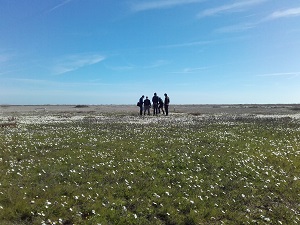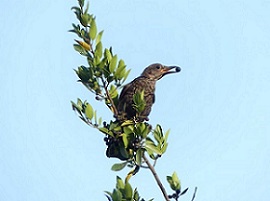
Welcome
Welcome to the official website of the Doñana Biological Station (EBD-CSIC)...

The Doñana Biological Station: EBD-CSIC
The Doñana Biological Station is a public Research Institute belonging to the Spanish Council for Scientific Research CSIC in the area of Natural Resources...

Mission
Our fundamental mission is to carry out multidisciplinary research of the highest standard directed to understanding the way in which biodiversity is generated, maintained and deteriorates, as well as the consequences of its loss...

Our methods
We apply many techniques within a multidisciplinary framework, from molecular genetics to remote sensing, and from modelling to physiological and isotopic analyses...

Monitoring the environment
Monitoring biodiversity at the Doñana Natural Space cover a wide range of communities, including both terrestrial and aquatic organisms...

Aims
Our aims include the study of the ecological and evolutionary processes by combining field work, mathematical and statistical models and physiological and genetic analysis...
 Outstanding
Outstanding
-
 Egyptian vultures breed more males in the Canary Islands than on the Iberian Peninsula
Egyptian vultures breed more males in the Canary Islands than on the Iberian Peninsula -
 Study reveals ecological keys of a peculiar luminous moss
Study reveals ecological keys of a peculiar luminous moss -
 Griffon vultures can move over an area of up to 10,000 km2 in a year
Griffon vultures can move over an area of up to 10,000 km2 in a year -
 Higher levels of biodiversity require larger territories
Higher levels of biodiversity require larger territories -
 Bird migration limits the adaptation of European plants to climate change
Bird migration limits the adaptation of European plants to climate change
 News
News
Content with tag ecology .
 Egyptian vultures breed more males in the Canary Islands than on the Iberian Peninsula
Egyptian vultures breed more males in the Canary Islands than on the Iberian Peninsula
 Study reveals ecological keys of a peculiar luminous moss
Study reveals ecological keys of a peculiar luminous moss
This unique plant is distributed in only a few areas of the Iberian Peninsula, especially in the north and northwest, and its ecology is still poorly known. Many of its populations are threatened by human activity.
 Griffon vultures can move over an area of up to 10,000 km2 in a year
Griffon vultures can move over an area of up to 10,000 km2 in a year
Results show that the management of these species, which exploit very large areas, cannot be approached at the local level and requires the collaboration...
 Higher levels of biodiversity require larger territories
Higher levels of biodiversity require larger territories
It is the first time that interactions between species are studied to explain the spacies-area relationship.





